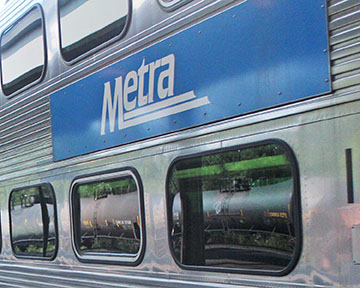Metra released the new train schedule with adjustments required by the new Positive Train Control safety system. Officials said they took into account suggestions from Flossmoor and other suburban commuters as best they could.
Metra unveiled the final version of a Metra Electric Line schedule change that was made necessary by the implementation of the new Positive Train Control (PTC) safety system. The new schedule, which can be viewed here, will take effect when the line is restored to full service following the coronavirus crisis.
Metra released a draft of the new schedule in February and requested public feedback. Nearly 2,000 customers replied via an online survey and a public meeting in Flossmoor. In response to that feedback, several revisions were made between the February draft and the final version.
“We want our customers to know that we heard their concerns and addressed them as best we could,” said Metra CEO/Executive Director Jim Derwinski. “Our goal was to craft a schedule that accommodates the needs of Positive Train Control while minimizing the impact of changes on our customers.”
Derwinski said the biggest adjustment was made to address concerns by suburban customers, particularly in Flossmoor, that not enough trains would stop in Hyde Park, especially inbound trains at 59th Street.
“In response, we have added Hyde Park stops to suburban trains in the morning and evening rush periods,” he noted.
- Morning suburban station trains will alternate between stopping at 59th Street and stopping at 55th/56th/57th Street, which mimics the current stopping pattern as closely as possible. For trains arriving downtown between 6:30 and about 9:30 a.m., four inbound suburban trains will stop at 51st/53rd (there were three in the draft), 12 trains will stop at 55th/56th/57th (there were 14 in the draft) and 11 trains will stop at 59th (there were three in the draft)
- Evening rush suburban trains will see three additional stops in Hyde Park. For trains departing downtown between 4 and 7 p.m., one outbound suburban train will stop at 51st/53rd (there were none in the draft), 13 will stop at 55th/56th/57th (there were 11 in the draft) and one will stop at 59th (there were none in the draft).
“Several adjustments to the schedules or stopping patterns of other trains were made on the final schedule in response to customer feedback. Other requested changes, however, could not be accommodated for various reasons,” Derwinski said.
For a summary of changes, click here.
PTC is a federally mandated safety system that will automatically stop a train if the engineer fails to obey a signal or exceeds the speed limit. The system integrates GPS, trackside sensors and communications units, onboard computers and Metra’s centralized train dispatching system.
Together, these components track trains and monitor the crew’s compliance with speed restrictions and signals. Although it can’t prevent all accidents, PTC increases safety by preventing train-to-train collisions, unauthorized entry by trains into work zones and derailments due to speeding or moving through misaligned track switches.
To handle as many passengers as it does in every morning rush period, Metra said it must quickly turn trains around at Millennium Station and send them back out to make more inbound trips. The same goes for the evening rush period, as trains complete their trips to the suburbs and turn back to pick up more customers downtown. Metra calls this process “flipping” a train, and it will take longer because of PTC.
To flip a train, the engineer must move from one end of the train to the other, and the crew must clear the train, perform a brake test and conduct a job briefing. With the added task of initializing the PTC system, these “flips” are expected to take more than 10 minutes.
According to Metra, on the current Metra Electric schedule, there are 51 trains scheduled to flip in less than 10 minutes, including 23 scheduled to flip in less than 6 minutes. The need to initialize PTC means it will not be possible to operate the same number of trains during rush hour, and so a new schedule is needed.
The final schedule retains the major components of the draft version. Those include:
- Dividing the suburban part of rush hour schedules into trains serving two groups of stations instead of the current three groups. Many trains will make more stops and train runs will take slightly longer. The size of trains will be adjusted to account for additional customers.
- The addition of a daily midday outbound suburban express train.
- Cross-platform transfers to and from express trains for Blue Island branch riders during inbound and outbound peak periods.
- Improved South Chicago branch service during off-peak times.
- Minor adjustments to off-peak train departures.
Related stories:
- Commuters make their case to Metra against ‘dramatic’ service cuts (March 6, 2020)
- Metra seeks public comment on Electric Line schedule changes (Feb. 18, 2020)
- Metra switching to alternate schedules on March 23 due to coronavirus (March 19, 2020)



